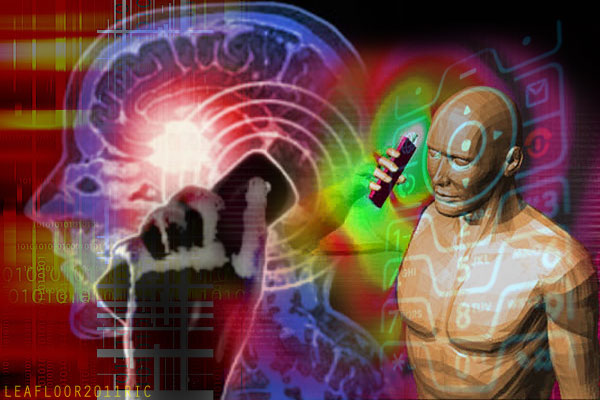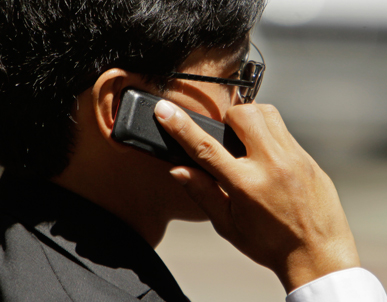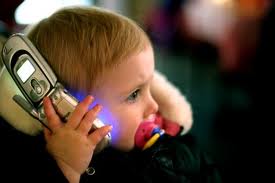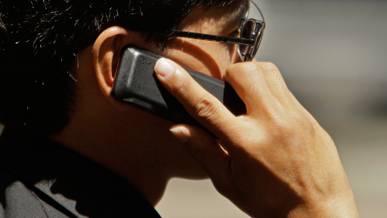Study Finds Cellphone Radiation Changes Brain Activity
Source: thedailybeast.com

A groundbreaking study published today by one of the world’s leading neuroscientists challenges the longstanding conviction that radiation emitted from cellphones is too weak to have an effect on the brain.
You can think of cellphone saturation as one giant, uncontrolled human experiment. There are now 293 million wireless connections in use in the United States, according to the trade group CTIA-The Wireless Association. And Americans log a staggering 2.26 trillion minutes yakking on those mobile devices every year—all at a time when the biological effects of cellphones remain controversial and the research on those effects often of dubious quality.
 A study published today by leading researchers in the premiere medical journal JAMA hasn’t found a smoking gun, but it does challenge the longstanding conviction that radiation emitted from cellphones is too weak to have an effect on the brain. It is notable not only for that finding and for appearing in a top journal—it is also turning heads because the lead researcher is Nora Volkow, director of the National Institute on Drug Abuse and one of the world’s leading brain scientists.
A study published today by leading researchers in the premiere medical journal JAMA hasn’t found a smoking gun, but it does challenge the longstanding conviction that radiation emitted from cellphones is too weak to have an effect on the brain. It is notable not only for that finding and for appearing in a top journal—it is also turning heads because the lead researcher is Nora Volkow, director of the National Institute on Drug Abuse and one of the world’s leading brain scientists.She and colleagues from the Department of Energy’s Brookhaven National Laboratory took brain scans of 47 healthy participants after they held a cellphone to their ears for 50 minutes. Significantly, the phone was muted; that ruled out the possibility that any changes in brain activity reflected listening to or thinking about the incoming speech. Yet with the phone simply "on," the scientists found a significant change in brain activity in the areas closest to its antenna. The research team "is on the brink of resolving a longstanding dispute with enormous implications for public health," argues Louis Slesin, who as editor of Microwave News has followed the subject since 1981.
Cancer is the big concern, but research in this area has been inconsistent and, in some cases, flat-out confounding. Prime example: Interphone, a massive 10-year study of 10,751 subjects by the World Health Organization’s International Agency for Research on Cancer published in May 2010, found that cellphone use decreased the risk of glioma, a form of brain cancer, by 19 percent—a finding that suggests a methodological flaw, because nobody believes cellphones can actually protect your brain. Some scientists continue to believe that there’s a link and have postulated a variety of theories about how cancer might be induced; others stand by the dogma that low radiation equals no cancer.
"Our study does not enlighten this controversy at all, sorry to tell you that," says Volkow. "What it does say is that our brains are sensitive to this electromagnetic radiation, which is fascinating."
To document brain activity, Volkow’s team measured glucose metabolism in the brain and found that it was 7 percent higher in people who were exposed to a cellphone in the "on" position. Neuroscientists are used to tracking glucose metabolism to study brain regions responsible for everyday activities, like talking, moving, and listening to music. Hook your participant up, play some Beethoven, and voila! The music-loving part of the brain lights up. That’s a normal physiological response.
 But Volkow’s team saw the brain light up in response to a cellphone that was on but muted—a disturbance by an external force. "That’s a very unusual finding," says Dr. Keith Black, chairman of neurosurgery at Cedars-Sinai Medical Center in Los Angeles. And the disturbance showed up in the brain areas closest to where the phone is typically held: the right orbitofrontal cortex and parts of the temporal lobe, which is responsible for memory, language, and vision. As we spend more and more time on our cellphones, Black asks, will our ability to manipulate language suffer over the long run? Will our long-term memory loss be affected as we age? "That becomes the concern," he says. And even more so for children, whose thinner scalps and skulls will absorb more radiation.
But Volkow’s team saw the brain light up in response to a cellphone that was on but muted—a disturbance by an external force. "That’s a very unusual finding," says Dr. Keith Black, chairman of neurosurgery at Cedars-Sinai Medical Center in Los Angeles. And the disturbance showed up in the brain areas closest to where the phone is typically held: the right orbitofrontal cortex and parts of the temporal lobe, which is responsible for memory, language, and vision. As we spend more and more time on our cellphones, Black asks, will our ability to manipulate language suffer over the long run? Will our long-term memory loss be affected as we age? "That becomes the concern," he says. And even more so for children, whose thinner scalps and skulls will absorb more radiation."What’s the impact of a cellphone on a child’s ability to learn? Does it impact cognitive ability?" Black asks. "Those are things we just don’t understand."
The research will generate plenty of questions and plenty of buzz. It is, after all, about cellphones, it appears in JAMA, and, as Slesin points out, Volkow is "something of a science superstar." CTIA-The Wireless Association, issued a statement in response saying that "peer-reviewed scientific evidence has overwhelmingly indicated that wireless devices, within the limits established by the FCC, do not pose a public-health risk or cause any adverse health effects." In fact, peer-reviewed science has been all over the map on the question of the biological effects of cellphone radiation, with some studies finding that the radiation kills, slows, or otherwise harms sperm, that it affects testicular function or structure, that it increases the risk of brain cancer—and other studies finding the opposite. Henry Lai, who co-wrote an editorial accompanying the study and is a research professor in the bioengineering department at the University of Washington, says that while the data in the new study are preliminary, there is an effect on the brain and "phone radiation is not completely safe."
Volkow isn’t stopping here. She wants to study the long-term effects of cellphone use, though she acknowledges this would be an expensive and lengthy endeavor. "It’s very difficult, but we’re going to try to tackle that," she says. In the meantime, she’s adjusting her mobile behavior. She’s not ditching her phone, but she’s now using an ear piece or speaker phone.
"Even though I don’t know that there are any adverse effects, it’s so simple to avoid the radiation exposure," she says. "My perspective on this is, ’why not?’"
Article from: thedailybeast.com
Cell Phone Exposure Effects on Brain; New Study Shows Impact of Radiation
Video from: YouTube.com
Also tune into:
Walter Graham - Wi-Fi, Cellphone Radiation, Microwaves and Electrosmog
Sabina DeVita - Electromagnetic Pollution, The Silent Invisible Pollutant
Nick Begich - Mind Control & Emerging Technologies






















